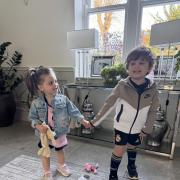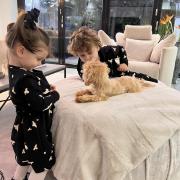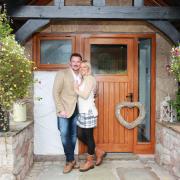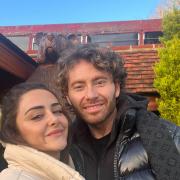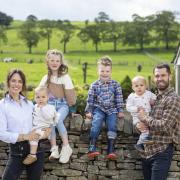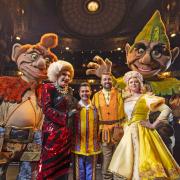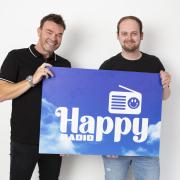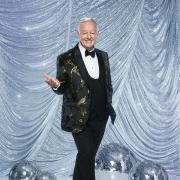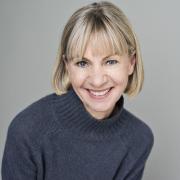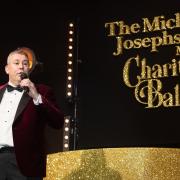The best-selling author tells the story of her life today and her journey getting there

Clare Mackintosh is a New York Times and Sunday Times bestselling author, whose books are published in more than 35 languages and have sold more than two million copies worldwide.
Her latest novel, After the End, is out now in paperback. The Clare Mackintosh free online book club and her social media sites have tens of thousands of followers and from November she will be writing a column about her life, family, and love of books in Cheshire Life.
Her own story is the stuff of literature – police officer, young mother overcome by the worst possible tragedy and now a writer of award-winning crime novels that are roundly praised for their sensitivity, readability, and page-turning qualities.
It was while Clare was working as a police officer in the Cotswolds that she and her husband Rob went through a course of IVF. Their twin boys, Josh and Alex, arrived prematurely, on bonfire night, 2006. Three weeks later, Alex contracted meningitis. Two weeks after that Clare and Rob made the decision to remove him from intensive care and allow him to die. When Josh was 15 months old, Clare gave birth to a second set of twins, Evie and George.
Clare now lives in North Wales and her Cheshire Life column will be about her family, her love of the region, her time in Cheshire, where she is a wild swimmer among other things, and her book recommendations, both with a regional flavour and global.
Here is her story...
I scrape the cake batter into the tin and hand the spoon to my daughter. She may be a short shrug away from teendom, but we’re all a child inside when there’s cake mix on offer. I have a sudden, visceral memory of baking with her almost a decade ago, in a different house – a different world. I watch her, the memory a lump in my throat.
She looks up. “What?”
I put the cake in the oven. “Nothing.”
I don’t recall the cakes we made that day – something sickly, something pink, no doubt – but everything else is engraved on my heart. I remember the frustration as my daughter made a mess I’d have to clear up. I remember wiping sticky hands on a Cath Kidston apron; watching the clock, simultaneously longing for work, and dreading it. I remember passing the baton of parenthood to my husband; one in, one out, like multi-storey car parks at Christmas. The ever-present buzz of my Blackberry. Sorry, I know it’s the weekend, but…
Four hours later I was standing at a sports stadium on the outskirts of Oxford, sweating in a helmet and fireproof boiler suit, calling for more resources as football hooligans threw bricks at my officers. Beneath our feet lay a carpet of crushed glass, as though the tarmac were dusted with sugar.
I loved my job. I’d joined the police in 1999 on what was known then as the High Potential Development Scheme, navigating the suspicion with which all graduates were viewed, and more than earning my stripes. I sat my Inspector’s exam five months pregnant with twins, already too vast to squeeze into the combination chair-desk provided. I was ambitious, driven, and good at my job. There was nothing I’d rather be doing.

Things change, don’t they?
I gave birth a month later. A terrifying, traumatic ordeal in which two baby birds were wrenched from me as I lay dry-eyed but screaming inside – too early, too early, too early… It was an ordeal that catapulted us into the life of intensive care parents. A life of driving to hospital before dawn, then driving home after dark. Of hushed conversations above a soundtrack of beeps and whirs; the sounds of machines that echoed through what little sleep we snatched. Even now, almost 13 years later, an alarm pitched at a particular frequency has the power to pull me back to intensive care, my heart racing, my palms clammy.
They tell you to hope for the best, but to expect the worst. Our own die rolled between the two: one of our sons died, the other lived. As I write this, it feels – even after all these years, after all the times I have shared our story – as though it cannot be real. It must surely have happened to someone else. It is too horrific, too hard.
Four months after our son came home, I fell pregnant with another set of twins. It should have been a miracle – it was a miracle – but for a time it felt like a curse. We had been there before, of course; in the pregnancy, in the labour room, in the ward. We had bought the two cots, the two car seats, the double pram. And we had returned them. We had realised what so many parents learn: that pregnancy is a promise, not a contract.
So I bought nothing. I made no preparations. For the most part, I largely ignored the burgeoning bump before me, as though I were merely the bearer of some awkward parcel which may or may not require delivery. Five months. Six. Seven months. Eight.
Two babies.
What followed was not straightforward, but as the months passed, I grew less convinced that my babies would be taken from me. I grew to enjoy motherhood without the constant threat of medical intervention and to open the nursery door without first bracing myself for what I might find.
The catalyst for this transition – slow and painful though it was – came in writing. I had always consumed books as though they were as essential to life as water and air, but now I was seized by the urge to put words on paper, to make sense of the mess of emotions inside me. How could I love my children, yet long to be alone? How could I hope to recover from the loss of my boy, when his twin was a living reminder?
I wrote online, on forums and blogs. I wrote in notebooks and on scraps of paper, and in fevered, unfinished documents on my laptop. And as I wrote, I mended.
I returned to work full time, as an Inspector and public order commander. Ma’am at work, Mum at home. One woman, doing two jobs, like so many women do. You can have it all, they tell us. What they don’t tell us, is that sometimes having it all, is just doing it all. Cupcakes in the morning, brickbats in the afternoon; potty training on Monday, staff appraisals on Tuesday. The Blackberry – that bloody Blackberry – buzzing all day, all night. Coming on holiday with us, ruling our lives. Just a minute, I’d say to the kids. The mantra of the working mother.
The turning point came before the breaking point – but only just. It concerned a peer assessment process, endured in 2011 as part of my preparation for the Chief Inspector rank. I read the anonymised comments from my colleagues and glowed with pride. I was unfailingly optimistic and extremely innovative. My door was always open, and I was reliably calm under pressure.
My husband laughed. “This is a great report,” he said. ‘But who’s it talking about? I don’t recognise her.”
I was not unfailingly cheerful at home. I was anything but calm under pressure. And if my domestic door was open, there was most decidedly no-one home. I had, I realised, been serving up the best bits of me to my colleagues, and giving my family the barely warm leftovers. I suspect I’m not alone.
It was an easy decision to hand in my notice. It was far harder to physically hand over my warrant card and walk away from a career I loved with all my heart, and in which I believed I might make a real difference. I severed ties with colleagues because it was simply easier that way, and I threw myself into the more pressing conundrum of how I might earn a living.
I did the only thing I knew how to do. I wrote. I wrote for magazines and newspapers, for pamphlets and brochures. I wrote website copy and social media content, and while those words were keeping the wolf from the door, I wrote a novel.
Nowadays I am often met with wistful musings from aspiring writers who ponder that they would like to write a novel, if only they had enough time. There is no such thing as enough time. There is only time, and it will ebb and flow to swallow whatever you place in it. Like most authors – particularly those writing their debuts – I wrote my first book late at night, after the children were fed and put to bed, and after the more important words – those that would pay the mortgage – had been written. I’ve been fortunate – more fortunate than most. That first novel, I Let You Go, became something of a sensation. To date, it has sold more than a million copies and been translated into forty languages, enabling me to jettison the brochure writing, and the attempts to find an interesting way to tweet about soap.
I exchanged football stadiums for airports; ten-hour shifts for a publicity tour and a nice hotel. I wrote while the children were in school, and waited at the school gate when they ran out each day. I was there for harvest festivals and nativities and sore tummies. I finally had it all.
When you realise a dream, it feels so magnificent that you want the whole world to feel the same. I watched as my husband – an armed protection officer – became so ground down by his job that he began grimly anticipating the next day’s shift even as he drove home from the last, and I wished I could take it all away.
“We should move,” I said suddenly. I was sitting on the sofa, legs propped up beneath the laptop, RightMove on my screen. ‘Have a fresh start. You could look after the kids, so I can write more.” I could see his thoughts taking shape before he found the words for them, considering the trade-off. What could be so good we’d want to up sticks and move for? What would he do, while the children were at school?
I turned the screen towards him.
Mountains.
My husband began his love affair with height at an indoor climbing centre in Berkshire. He has subsequently progressed through outdoor scrambles, summer summits, and ice climbing, to Everest base camp; returning grizzly and windburned, with socks that smelled so bad they walked in on their own. At the time of my proposal, he was taking regular trips to North Wales, and his eyes lit up at the prospect of walks on his doorstep. A short drive from the verdant hills of Cheshire, and with the Snowdonia mountain ranges close enough for a spur-of-the-moment excursion.
We put the house on the market and spent the money on a Georgian manor in North Wales, with a bedroom each for the children, and a beautiful office for me. We replaced the roof and addressed the damp issues, and slowly turned it into a home we all love. My mother was dubious.
“It sounds a very long way from a Marks and Spencer’s.”
I’d done my homework. “Wait till you see Cheshire Oaks.”
My literary agent shared similar concerns about my being ‘out in the sticks’.
‘How will you get to London?” Publishing is one of those industries that could exist anywhere and yet is almost entirely centered around the capital.
“There’s a direct train from Chester, I told her. Granted, I had to drive an hour to get to it, but I had already fallen in love with the city and saw no hardship in visiting. Chester, not London, is where I now go to the theatre, shop for a special outfit, or meet friends for lunch.
It has been four years since we packed up our house in the Cotswolds, and headed north. For a woman born and bred in the South of England, I feel more at home here than anywhere I have ever lived, and cannot imagine ever leaving.
“What?” My daughter prompts now, half amused, half frustrated by my lack of response. The cake mix spoon has been licked clean. I think of the time I’ve been able to spend with her and her siblings since I left the police; how much more freedom they’ve had since we moved to this beautiful part of the world. I think about how it’s possible to live more than one life, to start over in a new place, in a new way. I think, not of what we lost, all those years ago, but of everything we have gained since.
“Nothing,” I say again.
Everything. It is everything.
claremackintosh.com





